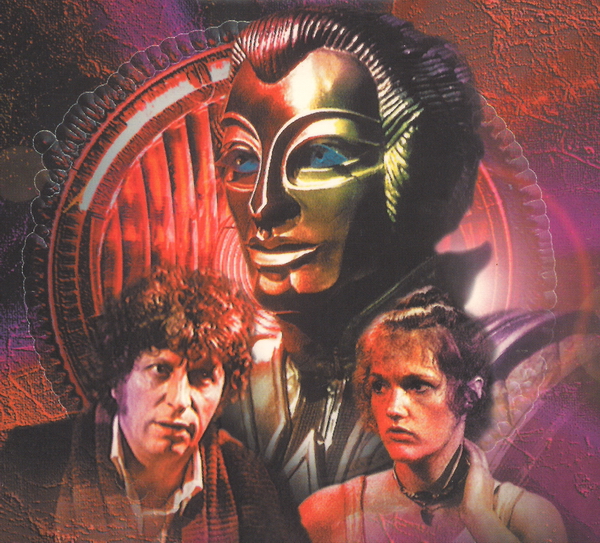|
| |
|
STORY PLACEMENT THIS STORY TAKES PLACE BETWEEN THE TV NOVELS "LAST MAN RUNNING" AND "PSI- ENCE FICTION."
WRITTEN BY CHRIS BOUCHER
RECOMMENDED PURCHASE OFFICIAL BBC PAPERBACK (ISBN 0- 563-55575-0) RELEASED IN NOVEMBER 1999.
BLURB Long ago and far away, the Doctor and Leela faced the
Robots
of Death... dependant on robots, the news that these benign, tireless, obedient labourers could be turned into killers would cause panic. So it was kept a secret.
BUT once again, the robots are being programmed to kill. Can the dead genius Taren Capel possibly be involved in this new outrage? |
|
|
Corpse Marker NOVEMBER 1999
With Chris Boucher jumping on the BBC Books’ bandwagon in 1998 with “Last Man Running”, a sequel to his revered television serial “The Robots of Death” hardly comes as a bolt from the blue. Lamentably though, “Corpse Marker” - which takes its name from the eponymous robots’ deactivation discs - is a tale of money, politics, sex and madness that bares little resemblance to the exceptional television serial that spawned it. And whilst this is not automatically a bad thing for a sequel (indeed, many of the best sequels often take the story in a new and unexpected direction), in this case it is!
“I am not Taren Capel. I’m the Doctor. I’m a Time Lord. You are not Taren Capel. You’re a robot. We are not Taren Capel.”
For the Doctor and Leela, this story is set almost preposterously soon after their original adventure on board the Storm Miner – potentially as little as one story (“Last Man Running”) removed -, and as a result everything feels a little bit skew-whiff, particularly when it is taken into account that for the survivors of the Storm Miner’s ill-fated crew, considerably longer has passed. For some reason, the Doctor and Leela just do not feel as connected to the events here as one would think that they should, given the relative recentness of “The Robots of Death” for them. “Long ago and far away” indeed.
Further, as was the case with his “Last Man Running”, the author’s unsophisticated prose is contrasted quite brutally with some markedly adult themes, rendering the tone of his story a little uncertain to say the least. Still, sluggish prose I can close my eyes to if the story is gripping enough, but unfortunately “Corpse Marker” also makes two fundamental slip-ups in the storytelling department.
For starters, the long-awaited follow-up to “The Robots of Death” is all but devoid of the distinctive art deco robots that made the original such a visually outstanding piece of television. Sure, there are plenty of Androids of Death to be found within the pages of “Corpse Marker”, but clad as they are in humanoid form they lack the unique character that the Dums, Vocs and Supervocs of the original story had in spates.
Secondly, and every bit as dreadfully, setting this story on the expansive streets of Kaldor City all but destroys the feelings of claustrophobia that one associates with “The Robots of Death”. Fair dues, on occasion one of the protagonists will be backed into a tight corner by an android assassin, but an escape route will always be at hand courtesy of a manhole or an alleyway. It just is not the same animal.
However, “Corpse Marker” is not all bad; in fact, parts of it are surprisingly engrossing. For instance, Lish Toos’ threads of the plot I found rather alluring – with this story being set some years after the original, Toos has become Captain of her own Storm Miner and a real hard-nosed rich bitch into the bargain. Her ensuing tales of sex and riches are arguably more Dynasty than Doctor Who, but they are a damn sight more compelling than Boucher’s uninspiring science-fiction plot.
Toos’ fellow “Robots of Death” survivors fare less well, however; Uvanov’s political wranglings utterly failed to strike any sort of chord with me, and whilst Poul’s descent into madness as his Grimwade’s syndrome (“robophobia”) flares up is a little more attention-grabbing, it hardly takes us anywhere that “The Robots of Death” did not.
“Kaldor City... Not my finest hour.”
On the whole
then, “Corpse Marker” is not a book that I would recommend, even (or
perhaps I should say especially) to those who hold up “The Robots
of Death” as being the best of the best. With three first-class television
serials under his belt and two meagre novels, there seems to be a pattern
emerging for Boucher, and it does not bode well for his next effort in
this medium.
|
|
|
Copyright © E.G. Wolverson 2006
E.G. Wolverson has asserted his right under the Copyright, Designs and Patents Act, 1988 to be identified as the author of this work. |
|
|
This novel’s blurb places it after the novel Last Man Running. As the events of Chris Boucher’s subsequent novels seem to follow on from those depicted here, we have placed this book between Last Man Running and Psi-ence Fiction.
|
|
|
Unless otherwise stated, all images on this site are copyrighted to the BBC and are used solely for promotional purposes. ‘Doctor Who’ is copyright © by the BBC. No copyright infringement is intended. |
|

.jpg)
.jpg)
